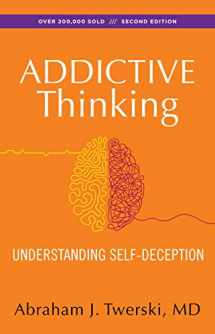
Addictive Thinking: Understanding Self-Deception
ISBN-13:
9781568381381
ISBN-10:
1568381387
Edition:
Second
Author:
Abraham J Twerski M.D.
Publication date:
1997
Publisher:
Hazelden Publishing
Format:
Paperback
156 pages
FREE US shipping
on ALL non-marketplace orders
Marketplace
from $15.65
USD
Marketplace offers
Seller
Condition
Note
Seller
Condition
New
Brand New! Not overstocks! Brand New direct from the publisher! Ships in sturdy cardboard packaging.
Book details
ISBN-13:
9781568381381
ISBN-10:
1568381387
Edition:
Second
Author:
Abraham J Twerski M.D.
Publication date:
1997
Publisher:
Hazelden Publishing
Format:
Paperback
156 pages
Summary
Addictive Thinking: Understanding Self-Deception (ISBN-13: 9781568381381 and ISBN-10: 1568381387), written by authors
Abraham J Twerski M.D., was published by Hazelden Publishing in 1997.
With an overall rating of 4.1 stars, it's a notable title among other
Psychology & Counseling
(Substance Abuse, Addiction & Recovery, Twelve-Step Programs, Gambling, Obsessive Compulsive Disorder (OCD)) books. You can easily purchase or rent Addictive Thinking: Understanding Self-Deception (Paperback) from BooksRun,
along with many other new and used
Psychology & Counseling
books
and textbooks.
And, if you're looking to sell your copy, our current buyback offer is $0.39.
Description
Author Abraham Twerski reveals how self-deceptive thought can undermine self-esteem and threaten the sobriety of a recovering individuals and offers hope to those seeking a healthy and rewarding recovery.
Abnormal thinking in addiction was originally recognized by members of Alcoholics Anonymous, who coined the term "stinking thinking." Addictive thinking often appears rational superficially, hence addicts as well as their family members are easily seduced by the attendant--and erroneous--reasoning process it can foster.
In Addictive Thinking, author Abraham Twerski reveals how self-deceptive thought can undermine self-esteem and threaten the sobriety of a recovering individual. This timely revision of the original classic includes updated information and research on depression and affective disorders, the relationship between addictive thinking and relapse, and the origins of addictive thought. Ultimately, Addictive Thinking offers hope to those seeking a healthy and rewarding life recovery.
Abnormal thinking in addiction was originally recognized by members of Alcoholics Anonymous, who coined the term "stinking thinking." Addictive thinking often appears rational superficially, hence addicts as well as their family members are easily seduced by the attendant--and erroneous--reasoning process it can foster.
In Addictive Thinking, author Abraham Twerski reveals how self-deceptive thought can undermine self-esteem and threaten the sobriety of a recovering individual. This timely revision of the original classic includes updated information and research on depression and affective disorders, the relationship between addictive thinking and relapse, and the origins of addictive thought. Ultimately, Addictive Thinking offers hope to those seeking a healthy and rewarding life recovery.


We would LOVE it if you could help us and other readers by reviewing the book
Book review

Congratulations! We have received your book review.
{user}
{createdAt}
by {truncated_author}


